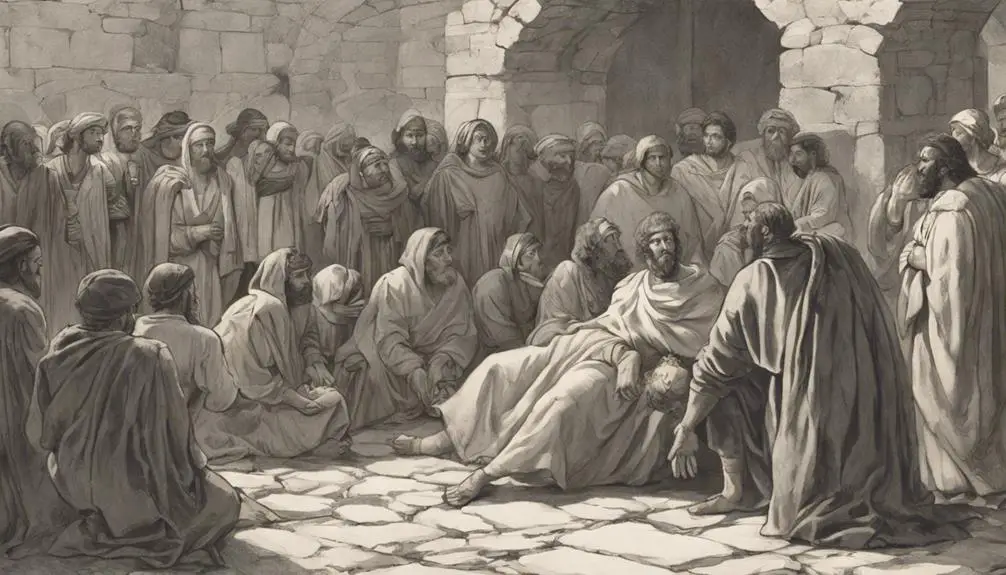Uncover the timeless tale of Ananias and Sapphira, where honesty's weight in the Bible challenges our integrity today—dare to delve deeper?

Story About Honesty in the Bible
In the vast sea of narratives within the Bible, the tale of Ananias and Sapphira stands out like a lighthouse, guiding the way toward the paramount importance of honesty.
You'll find yourself navigating through the early days of the Christian church, where this couple's decision to deceive about their donation sends shockwaves through the community.
As you explore the context and background, you'll uncover lessons on integrity that are as relevant today as they were millennia ago.
The impact on early Christians and the modern-day implications pose questions that might change how you view honesty in your life.
What will you uncover as you consider the consequences of their actions and their relevance to today's world?
Key Takeaways
- The story of Ananias and Sapphira emphasizes the critical importance of honesty in maintaining community trust and integrity.
- It serves as a stark reminder of the severe consequences that dishonesty can have, not just on individuals, but on the wider community.
- The narrative teaches that truthfulness is a non-negotiable value in building and sustaining ethical communities, reflecting on early Christian values.
- This biblical account offers a timeless lesson on the necessity of upholding honesty and transparency in all aspects of life.
The Tale of Ananias and Sapphira

In the narrative of Ananias and Sapphira, we observe a sobering lesson on the gravity of dishonesty before God, illustrating the early Christian community's emphasis on integrity and truthfulness. The account, profound in its simplicity, underscores the dire consequences of deceit, not just on a personal level but within the collective ethos of the nascent church. Divine intervention in this story is immediate and irrevocable, marking a distinct moment where the supernatural intersects with the mundane to enforce moral accountability.
This divine intervention isn't merely punitive; it serves as a stark reminder to the community and its members about the sanctity of their commitment to each other and to God. The response from the community following this event is notably one of fear and introspection. This reaction is indicative of the early Christian community's understanding of God's active presence in their lives and the seriousness with which they regarded communal integrity. The swift and fatal consequence faced by Ananias and Sapphira isn't just a personal tragedy but a communal warning against the perils of hypocrisy and dishonesty.
The tale, therefore, isn't just about the misdeeds of two individuals but a broader commentary on the values that underpinned the early Christian community. It highlights the collective responsibility towards maintaining a transparent and truthful fellowship, underscored by the belief that divine oversight was an ever-present reality. As you delve deeper into this narrative, it becomes apparent that the early Christians saw themselves as part of a divinely guided community where honesty wasn't just a moral preference but a foundational principle.
Context and Background

Delving into the story of Ananias and Sapphira requires understanding the broader socio-religious landscape of the early Christian community, where honesty served as a cornerstone of communal identity and spiritual integrity. This narrative, deeply embedded in ancient storytelling traditions, reflects not only the moral values of the time but also the cultural influences that shaped early Christian teachings.
Ancient storytelling, particularly within the Bible, was more than mere entertainment; it was a vehicle for imparting essential moral and ethical teachings. The story of Ananias and Sapphira, for instance, serves as a cautionary tale about the consequences of deceit within a community founded on the principles of honesty and sharing.
Cultural influences played a significant role in how these stories were crafted and understood. The early Christian community was set against a backdrop of Roman occupation, where diverse religious and cultural practices coexisted. This context influenced the development of a communal identity that emphasized values like honesty, transparency, and mutual support.
Aspect |
Influence on Story |
|---|---|
Ancient Storytelling |
Moral and ethical framework |
Cultural Influences |
Shaping of communal values |
Socio-Religious Context |
Underpinning of narrative |
Lessons on Integrity

Reflecting on the story of Ananias and Sapphira, it's crucial to explore how their narrative underscores the importance of integrity within the early Christian community. This account isn't just a cautionary tale; it serves as a profound lesson on the consequences of forsaking truthful living for personal gain. Their demise illustrates the gravity of ethical dilemmas faced by believers, emphasizing that integrity isn't merely an ideal but a foundational ethic in the fabric of communal faith.
In navigating the complexities of this story, you're compelled to confront the stark contrast between the appearance of virtue and the reality of one's heart. Ananias and Sapphira's actions reveal a breach of trust not only with their community but, more significantly, with God. This breach underlines the critical nature of honesty as the cornerstone of a community's moral and spiritual health. Their story is a vivid demonstration that integrity involves more than external compliance; it demands a consistent alignment of one's actions and intentions with the principles of truthful living.
Moreover, this narrative challenges you to consider the implications of your choices in the face of ethical dilemmas. It prompts a reflection on the value of transparency and the perils of duplicity. In essence, the downfall of Ananias and Sapphira serves as a stark reminder that the pursuit of integrity isn't optional but essential for maintaining the cohesion and purity of any community, especially one based on faith.
Thus, their story isn't merely historical; it's a timeless call to uphold integrity in every aspect of life, urging a deeper commitment to truthful living amidst the complexities of ethical dilemmas.
Impact on Early Christians

The story of Ananias and Sapphira significantly influenced early Christian communities, underscoring the non-negotiable value of honesty for maintaining communal integrity and trust. This narrative, found in the Acts of the Apostles, serves as a stark reminder of the consequences of deceit within a spiritual community. You're invited to explore how this event shaped the ethical landscape of early Christianity, fostering an environment where truthfulness was paramount.
In analyzing the impact, it becomes clear that the story resonated deeply within these fledgling communities, instigating a series of community reactions and ethical dilemmas, including:
- A heightened sense of accountability: Members understood that their actions, especially those concerning communal resources, weren't merely personal decisions but had implications for the entire community.
- A reinforcement of community values: The incident acted as a deterrent against dishonesty, reinforcing the principle that integrity was foundational to the Christian way of life.
- Navigating ethical dilemmas: The story prompted early Christians to grapple with complex moral questions, such as the balance between communal sharing and personal ownership, and how to deal with transgressions within their midst.
These elements collectively contributed to shaping a community that was acutely aware of the importance of honesty. The narrative of Ananias and Sapphira didn't just serve as a cautionary tale; it underlined the necessity of transparency and truthfulness for the survival and flourishing of the early Christian church. Through this lens, you're encouraged to appreciate how foundational stories influence communal ethics and behavior, shaping the moral compass of a community in its formative stages.
Modern-Day Implications

Considering the profound impact of honesty in early Christian communities, it's essential to explore its relevance and application in today's world. The narratives and teachings about honesty in the Bible set a foundation that not only shaped the moral compass of early Christian societies but also offers a timeless principle that confronts you with ethical dilemmas in a modern context.
You're living in an era where information is omnipresent, yet the clarity between truth and falsehood often blurs, making truth-telling importance more critical than ever. In the face of contemporary challenges—be it in politics, business, or personal relationships—the biblical stories about honesty invite you to reflect on the ethical implications of your actions and decisions. These narratives serve as a moral compass, guiding you through the complexities of today's ethical dilemmas with wisdom and integrity.
Moreover, the emphasis on honesty in the Bible encourages you to foster transparent and truthful interactions, which are fundamental for building trust and sustaining healthy communities. In a world where misinformation can spread rapidly, your commitment to honesty becomes a powerful tool for combating falsehood and promoting understanding.
Frequently Asked Questions
How Does the Concept of Honesty in the Bible Compare With Honesty as Depicted in Other Religious Texts?
When comparing honesty in the Bible to its portrayal in other religious texts, you're exploring cultural perspectives and ethical parallels across diverse beliefs.
These texts often reflect their societies' values, showing that honesty's core essence is universally respected, albeit with variations in interpretation and application.
This analysis reveals deep connections and differences, underscoring the complex role honesty plays in shaping moral and ethical standards across civilizations.
Are There Any Archaeological or Historical Evidences That Corroborate the Story of Ananias and Sapphira?
When you delve into the quest for evidence, you'll find that Ananias artifacts and Sapphira excavations are elusive. Scholars have yet to uncover concrete archaeological or historical proof directly linking to their tale.
This absence doesn't debunk the narrative but rather highlights the challenges in affirming ancient stories through physical finds. Your exploration into the past is a journey through layers of time, where facts and faith intertwine, offering a nuanced understanding of history.
How Have Different Christian Denominations Interpreted the Moral Lessons From the Story of Ananias and Sapphira?
Different Christian denominations have diverse interpretive variations on the moral lessons drawn from Ananias and Sapphira's story. These denominational perspectives range from warnings against hypocrisy to emphasizing the importance of complete honesty with God and the community.
You'll find that some view it as a cautionary tale about the deadly consequences of deceit, while others focus more on fostering a culture of transparency and integrity within the church.
What Are the Psychological Implications of the Story of Ananias and Sapphira on Believers and Non-Believers Alike?
Analyzing the psychological implications, you'll find that fear manipulation and behavioral psychology play key roles. This narrative can instill a deep sense of caution in both believers and non-believers, affecting their actions and mindset.
Essentially, it's a powerful example of how fear can be used to guide behavior, encouraging honesty and integrity. Such stories resonate on a psychological level, influencing decisions and moral compasses across diverse audiences.
Can the Principle of Honesty as Taught in the Bible Be Applied in Secular Contexts, Such as in Business or Government, and How?
Absolutely, the principle of honesty can shine like a beacon in secular spheres, such as business or government. Ethical leadership, rooted in transparency, fosters trust and long-term success.
When you're transparent, you're not only adhering to a moral compass but also demonstrating the practical benefits of honesty. It's a foundation that, when laid in any context, can lead to healthier organizational cultures and more robust, trustworthy relationships.
Conclusion
In examining the tale of Ananias and Sapphira, you've delved into a narrative rich in lessons about integrity and honesty. This story not only underscored the values of early Christians but also resonates today.
Consider a modern corporation caught in financial deceit; much like Ananias and Sapphira, it faces public fallout. The story's enduring relevance highlights the timeless significance of honesty, urging you to reflect on its importance in both personal and collective contexts.



Sign up